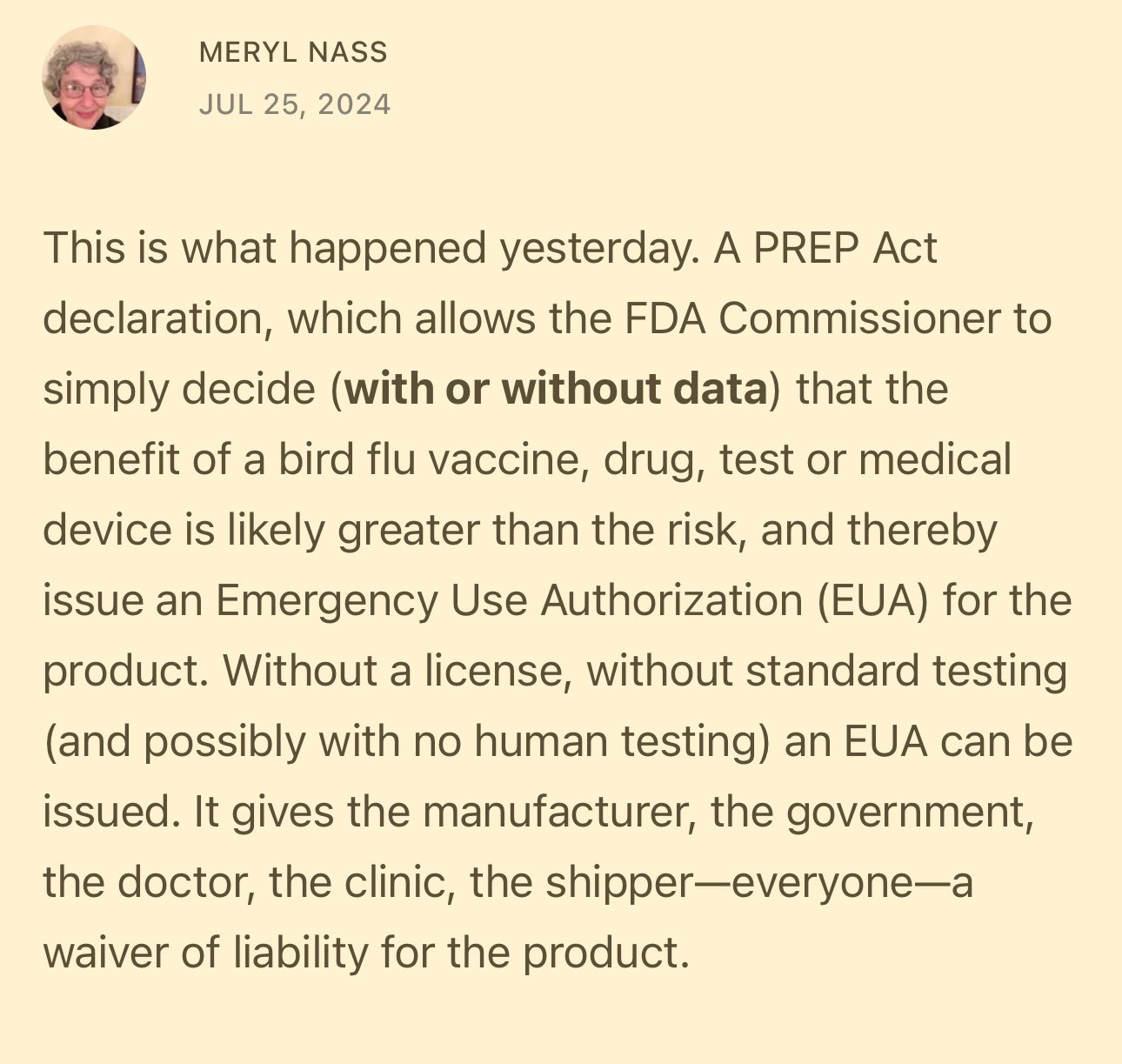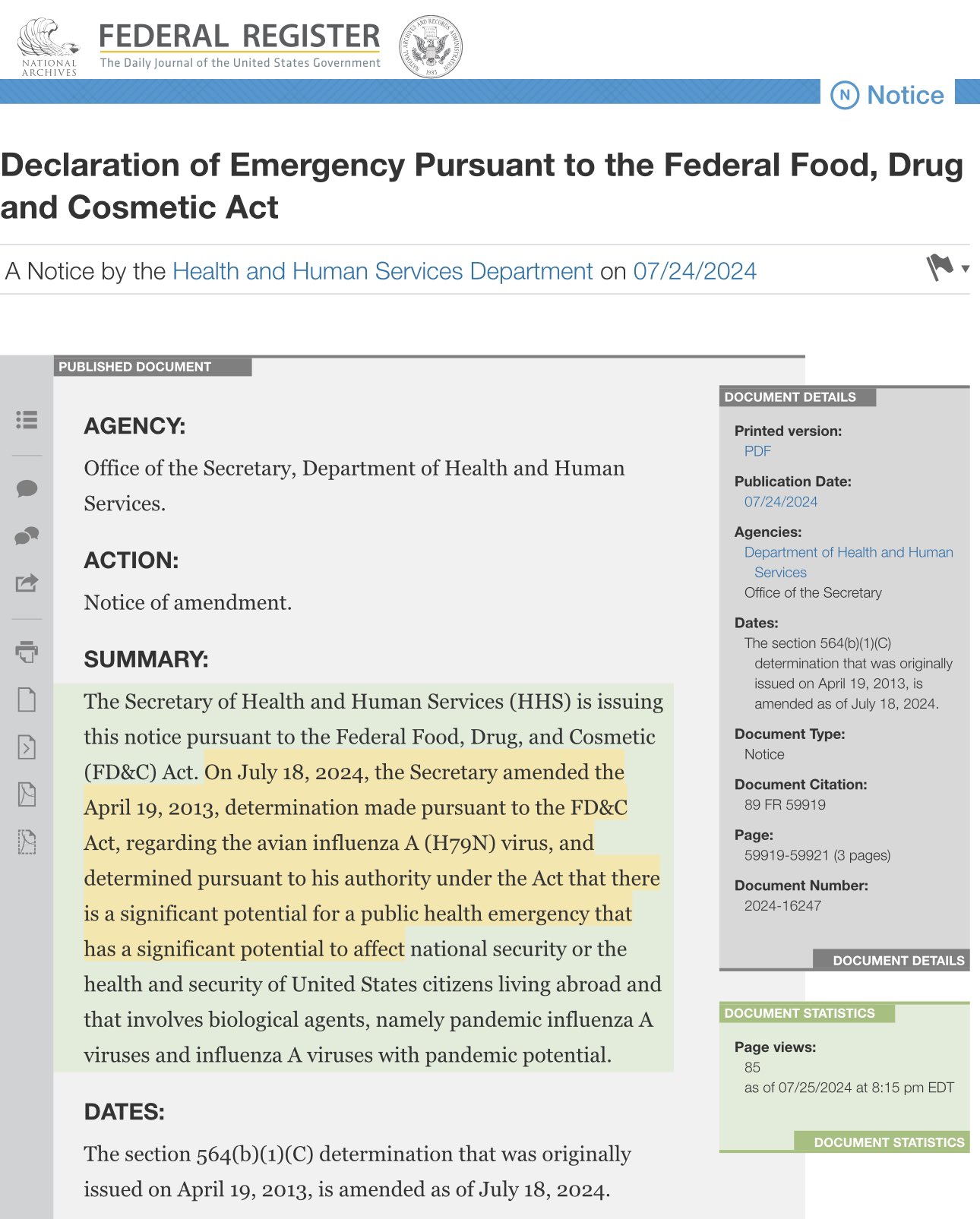The Department of Health and Human Services (HHS) released an amendment to the Federal Food, Drug, and Cosmetic (FD&C) Act regarding avian influenza, stating “there is a significant potential for a public health emergency.”
“On July 18, 2024, the Secretary amended the April 19, 2013, determination made pursuant to the FD&C Act, regarding the avian influenza A (H79N) virus, and determined pursuant to his authority under the Act that there is a significant potential for a public health emergency that has a significant potential to affect national security or the health and security of United States citizens living abroad and that involves biological agents, namely pandemic influenza A viruses and influenza A viruses with pandemic potential,” the notice read.
“Secretary of HHS Becerra expanded the declaration of emergency and determined pursuant to his authority under the Act that there is a significant potential for a public health emergency that has a significant potential to affect national security or the health and security of United States citizens, which would allow FDA commissioner to issue EUA to include the avian flu (H79N) virus products,” Dr. Kat Lindley said.
Secretary of HHS Becerra expanded the declaration of emergency and determined pursuant to his authority under the Act that there is a significant potential for a public health emergency that has a significant potential to affect national security or the health and security of… https://t.co/1xrW0hV39J pic.twitter.com/h5VgDdnMzA
— Dr. Kat Lindley (@KLVeritas) July 26, 2024
* Images from Dr. Kat Lindley X Post *
“The American Medical Association issued a set of CPT codes for doctors to use when administering a CSL Sequirus bird flu shot,” Dr. Meryl Nass wrote on Substack.
“HHS Secretary Becerra just issued a PREP Act declaration for bird flu. This allows the FDA Commissioner to issue EUAs for bird flu vaccines, with no liability. The US government has ordered 4.8 million doses of bird flu from the CSL Sequirus company, produced in dog kidney cells and using a dangerous squalene-containing adjuvant. The AMA issued CPT codes for this vaccine last Friday, so doctors could be reimbursed for administering it,” Robert F. Kennedy Jr. said.
“There have been a total of 11 cases of bird flu in the US since 2022, all mild, most involving just conjunctivitis. None were shown to have been transmitted human-to-human. Why would you need this vaccine, unless you expected a much more virulent virus to appear which had mysteriously gained the ability to spread between humans?” he added.
HHS Secretary Becerra just issued a PREP Act declaration for bird flu. This allows the FDA Commissioner to issue EUAs for bird flu vaccines, with no liability.
The US government has ordered 4.8 million doses of bird flu from the CSL Sequirus company, produced in dog kidney…
— Robert F. Kennedy Jr (@RobertKennedyJr) July 26, 2024
From Meryl Nass:
CSL Sequirus made the H5N8 bird flu vaccine being used in Finland right now, where the first humans are receiving an MF59-containing bird flu vaccine grown in chicken eggs (and not made in the US). Fifteen EU countries have together ordered 665,000 doses with an option for 40 million total. There is no bird flu in chickens, cows or humans in Finland now. In fact, Finland has only identified one wild bird all this year that tested positive for bird flu.
The US government has ordered 4.8 million doses of bird flu vaccine from CSL Sequirus, grown in MDCK dog kidney cells in a factory in Holly Springs, North Carolina with a troubled past. And it contains the same harmful adjuvant, MF59, that is added to the Sequirus vaccine going to the EU.
This factory was supposed to be a big deal. $500 million dollars from the USG and $500-700 million from Novartis were used to create a more rapid way of making vaccines for pandemics. The strategy was discussed during the GWB administration, but ground was broken for the factory in 2009, and Obama’s DHHS Sec Sibelius attended.
Using MDCK cells to make vaccines was a new idea. But something happened. It did not work out well. FDA wouldn’t approve the plant.
Finally they got an FDA approval in 2014, and then the plant was immediately sold for $275 million to Sequirus—around a quarter of what it was supposed to be worth. Perhaps a reader can tell me what the problem(s) were.
Subsequently there were yet additional delays, but in 2022 Sequirus announced they were approved to produce 150 million doses of seasonal or pandemic flu vaccines for the US government. What took so long?
AMA anticipating the bird flu pandemic? What do they know that we don’t?
“The provisional CPT code is effective for use on the condition the H5N8 Influenza virus vaccine candidates receive emergency use authorization from the U.S. Food and Drug Administration (FDA). The AMA is… pic.twitter.com/yBD3QTwcDI
— Dr. Kat Lindley (@KLVeritas) July 25, 2024
* Image from Dr. Kat Lindley X Post *
The American Hospital Association noted:
The Department of Health and Human Services July 23 released an amendment to a 2013 emergency declaration under the Food, Drug and Cosmetic Act that broadens the scope in which the agency can help facilitate certain medical countermeasures in response to a public health emergency such as a pandemic. The amendment now applies to pandemic influenza A viruses and others with pandemic potential, such as the current H5N1 strain of bird flu that has infected cattle and subsequently humans in some states. Previously, the declaration specifically covered just the H7N9 strain of bird flu. The declaration would allow the Food and Drug Administration to extend the expiration date of certain medical products and allow HHS to issue an emergency use authorization for unapproved drugs, devices or products, among other actions.
Read the full declaration from the HHS HERE.
Source link




